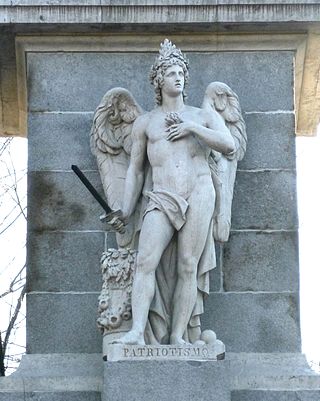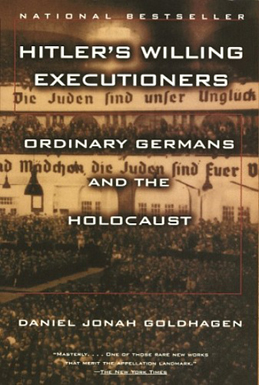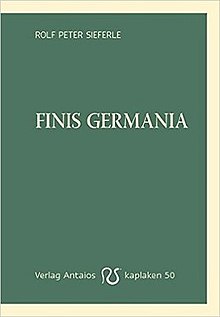
Cultural imperialism comprises the cultural dimensions of imperialism. The word "imperialism" describes practices in which a country engages culture to create and maintain unequal social and economic relationships among social groups. Cultural imperialism often uses wealth, media power and violence to implement the system of cultural hegemony that legitimizes imperialism.

Oswald Arnold Gottfried Spengler was a German polymath whose areas of interest included history, philosophy, mathematics, science, and art, as well as their relation to his organic theory of history. He is best known for his two-volume work The Decline of the West, published in 1918 and 1922, covering human history. Spengler's model of history postulates that human cultures and civilizations are akin to biological entities, each with a limited, predictable, and deterministic lifespan.

Patriotism is the feeling of love, devotion, and a sense of attachment to a country or state. This attachment can be a combination of different feelings for things such as the language of one's homeland, and its ethnic, cultural, political, or historical aspects. It may encompass a set of concepts closely related to nationalism, mostly civic nationalism and sometimes cultural nationalism.

Germania, also more specifically called Magna Germania, Germania Libera, or Germanic Barbaricum to distinguish it from the Roman provinces of Germania Inferior and Germania Superior, was a historical region in north-central Europe during the Roman era, which was associated by Roman authors with the Germanic peoples. According to Roman geographers, this region stretched roughly from the Rhine in the west to the Vistula in the east, and to the Upper Danube in the south, and the known parts of southern Scandinavia in the north. Archaeologically, these people correspond roughly to the Roman Iron Age of those regions.

Johann Gottfried von Herder was a German philosopher, theologian, poet, and literary critic. He is associated with the Enlightenment, Sturm und Drang, and Weimar Classicism. He was a Romantic philosopher and poet who argued that true German culture was to be discovered among the common people. He also stated that it was through folk songs, folk poetry, and folk dances that the true spirit of the nation was popularized. He is credited with establishing or advancing a number of important disciplines: hermeneutics, linguistics, anthropology, and "a secular philosophy of history."

The Germania, written by the Roman historian Publius Cornelius Tacitus around 98 AD and originally entitled On the Origin and Situation of the Germans, is a historical and ethnographic work on the Germanic peoples outside the Roman Empire.
Theodore Bruce Bawer is an American-Norwegian writer. Born and raised in New York, he has been a resident of Norway since 1999 and became a citizen of Norway in 2024. He is a literary, film, and cultural critic and a novelist and poet, who has also written about gay rights, Christianity, and Islam.

Christopher Henry Dawson was an English Catholic historian, independent scholar, who wrote many books on cultural history and emphasized the necessity for Western culture to be in continuity with Christianity not to stagnate and deteriorate. Dawson has been called "the greatest English-speaking Catholic historian of the twentieth century" and was recognized as being able to expound his thought to "Catholic and Protestant, Christian and non-Christian."

The Hilleviones were a Germanic people occupying an island called Scatinavia in the 1st century AD, according to the Roman geographer Pliny the Elder in Naturalis Historia, written circa 77 AD. Pliny's Scatinavia is generally believed to have referred to the Scandinavian peninsula, which in the 1st century AD had not yet been fully explored by the Romans and was therefore described as an island. Pliny wrote that it was an island "of a magnitude as yet unascertained". The Hilleviones lived in the only part of the island that was known, and according to Pliny, they thought of their 500 villages as a separate (alterum) world.

Hitler's Willing Executioners: Ordinary Germans and the Holocaust is a 1996 book by American writer Daniel Goldhagen, in which he argues collective guilt, that the vast majority of ordinary Germans were "willing executioners" in the Holocaust because of a unique and virulent "eliminationist antisemitism" in German political culture which had developed in the preceding centuries. Goldhagen argues that eliminationist antisemitism was the cornerstone of German national identity, was unique to Germany, and because of it ordinary German conscripts killed Jews willingly. Goldhagen asserts that this mentality grew out of medieval attitudes rooted in religion and was later secularized.
Christopher Caldwell is an American journalist and a former senior editor at neoconservative magazine The Weekly Standard to the Financial Times, and a former contributor of book reviews at Slate. He is a senior fellow at the conservative think tank Claremont Institute and contributing editor to the Claremont Review of Books. His writing also appears in The Wall Street Journal and The New York Times, where he is a contributing opinion writer.

Douglas Murray is a British author and conservative political commentator, cultural critic, and journalist. He founded the Centre for Social Cohesion in 2007, which became part of the Henry Jackson Society, where he was associate director from 2011 to 2018.
Diana West is an American conservative author and former columnist. She wrote a weekly column from 1998 until 2014 that was syndicated nationally. Her books include The Death of the Grownup (2007) and American Betrayal (2013).

Publius Cornelius Tacitus, known simply as Tacitus, was a Roman historian and politician. Tacitus is widely regarded as one of the greatest Roman historians by modern scholars.

Art history is, briefly, the history of art—or the study of a specific type of objects created in the past.

Reflections on the Revolution in Europe: Immigration, Islam, and the West is a 2009 book by Christopher Caldwell about the impact of the mass immigration of Muslims to Europe in the 20th century.
The Germani cisrhenani, or "Left bank Germani", were a group of Germanic peoples who lived west of the Lower Rhine at the time of the Gallic Wars in the mid-1st century BC.

Cambodian genocide denial is the belief expressed by some academics that early claims of atrocities committed by the Khmer Rouge government (1975–1979) in Cambodia were much exaggerated. Many scholars of Cambodia and intellectuals opposed to the US involvement in the Vietnam War denied or minimized reports of human rights abuses of the Khmer Rouge, characterizing contrary reports as "tales told by refugees" and US propaganda. They viewed the assumption of power by the Communist Party of Kampuchea as a positive development for the people of Cambodia who had been severely impacted by the Vietnam War and the Cambodian Civil War. On the other side of the argument, anti-communists in the United States and elsewhere saw in the rule of the Khmer Rouge vindication of their belief that the victory of Communist governments in Southeast Asia would lead to a "bloodbath."

The Myth of the Eastern Front: The Nazi–Soviet War in American Popular Culture (2008) by Ronald Smelser and Edward J. Davies, is a historical analysis of the post-war myth of the "Clean Wehrmacht", the negative impact of the Wehrmacht and the Waffen-SS mythologies in popular culture, and the effects of historical negationism upon cultural perceptions of the Eastern Front of the Second World War.
Rolf Peter Sieferle (1949–2016) was a German historian known for applying the methodology of the social sciences to contemporary topics including ecological sustainability and social capital. He was a pioneer scholar of German environmental history. His work was wide ranging, addressing German conservatism around the period of the First World War, Karl Marx, and the fall of Communism. He was an advisor on climate change to the Angela Merkel government.















